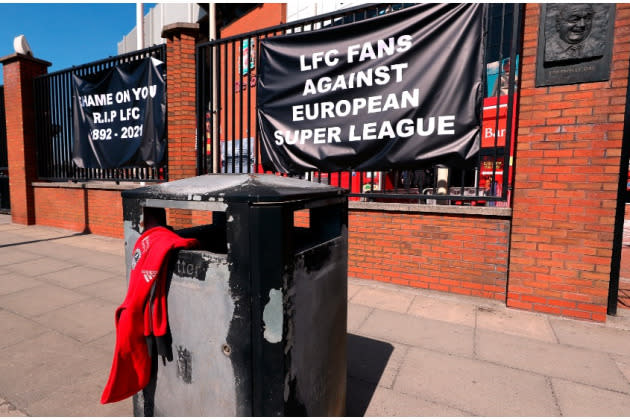European Super League Explained: Here’s Why Soccer Broadcasters, Leagues and Fans Are Up in Arms

A handful of Europe’s biggest clubs — or at least its most profitable clubs — under the cover of darkness late Sunday evening released a letter outlining plans to form a breakaway European Super League, consolidating the power and money for European club football in the hands of those few owners. Unsurprisingly, it boils down to broadcast rights: although the 12 co-signing clubs have argued otherwise, the main point of contention seems to be that they are unhappy with their split of broadcast money and want a bigger piece of the pie they believe they’re responsible for baking.
The league covers six clubs from England (Manchester United, Liverpool, Manchester City, Chelsea, Arsenal, Tottenham); three from Spain (Real Madrid, Barcelona, Atlético de Madrid); and three from Italy (Juventus, Inter Milan and AC Milan) — all of which would no longer participate in current continental tournaments, such as the Champions and Europa Leagues, and organize their own mid-week competition, the European Super League.
More from Variety
Premier League Announces Pay-Per-View Plan for League Matches - Mipcom Roundup
ViacomCBS Nabs Early Access to UEFA Champions League in Bid to Spur Streaming
Under the proposal, the clubs would, if they get their way, continue to play on weekends in their domestic leagues. However, many fans and pundits are calling for the removal of these clubs from all European competition, including their domestic leagues, and the Union of European Football Associations has threatened that players on European Super League clubs would be banned from playing on their national teams.
In a press conference this afternoon, UEFA president Aleksander Čeferin didn’t hold back, saying: “The players that will play in the Super League will be banned from playing in the World Cup and Euros. They will not be allowed play for their national teams”
Although the news is shocking in its scale, its arrival isn’t surprising to most who follow the sport. In 2009, then Arsenal manager Arsene Wenger predicted some sort of Super League within the next decade, specifically because the cost of running a top-level club was outpacing the TV revenue distributed from UEFA.
“The national leagues will survive but maybe in 10 years, you will have a European league,” he explained at the time. “The way we are going financially is that even the money that will be coming in from the Champions League will not be enough for some clubs because they spend too much money.”
As Sunday’s news unfolded, it was rumored by Italian paper Corriere dello Sport that streaming platform DAZN was attached to the new Super League. When asked about its involvement, the streamer released a statement denying the allegations: “Concerning a report by Corriere Dello Sport on Sunday in Italy, this and related reports are false. Neither DAZN nor Mr. Blavatnik are in any way involved or interested in entering into discussions regarding the establishment of a Super League, and no conversations have taken place.“
Surely though, DAZN and other streamers must stay tuned to further developments, as a consolidation of Europe’s most popular clubs would mean a consolidation of TV audiences as well. Linear broadcasters will certainly be tuned in to any developments, with current European rightsholders such as BT Sport in the U.K., Movistar in Spain, Canal Plus in France and Sky in several territories sure to fight tooth and nail to get their hands on what could become the sport’s biggest annual tournament.
When asked for comment, a BT spokesperson said: “BT recognizes the concerns raised by many of football’s leading voices and fans, and believes the formation of a European Super League could have a damaging effect to the long term health of football in this country. As a sport broadcaster showing Premier League, UEFA club football and National League football as well as being lead partner for all the Home Nations football teams, we strongly believe that football makes a significant positive contribution to people’s lives at every level, and this needs to be protected.”
Backlash to the announcement was instant and furious on Sunday evening as pundits for major broadcasters, most notably former Manchester United defender Gary Neville on Sky Sport’s Sunday evening coverage, seemingly unanimously spoke out against the proposed league.
Meanwhile, social media platforms have been inundated with angry messages from fans who are vehemently opposed to the proposed super league, and heads of state have even gotten involved, with Boris Johnson and Emmanuel Macron both issuing strong statements against the proposal.
A furious Gary Neville has hit out at plans to launch a breakaway European Super League, labelling the English clubs involved a "disgrace" and calling for them to face sanctions from the Premier League.
— Sky Sports (@SkySports) April 18, 2021
Best of Variety
Sign up for Variety’s Newsletter. For the latest news, follow us on Facebook, Twitter, and Instagram.
